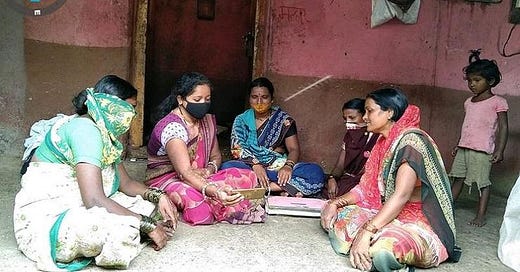Fixing the Ecosystem: BC certification, Gender sensitization & more!
The availability of well trained and low-cost Business Correspondents (BCs) lies at the core of India’s financial inclusion objectives. However, the fact that the overwhelming majority of BCs currently operating in the country are not compliant with RBI’s certification mandate is proof that the current system needs a relook. Our latest ICFI White Paper, “Certification or Inclusion: The Challenge Facing India's Business Correspondents”, deep dives into the problem. It supports the recommendation for graded certification made by the RBI Committee for Medium-term Path for Financial Inclusion. But it goes further and calls for letting BCNMs and Banks provide basic training and certification required for the lowest tier of agents who perform basic services, with the higher rungs being provided superior training and certification. We believe this is an opportunity for the Working Group set up by the DFS to work with the RBI and IIBF, put together official data regarding the variety of services being offered by BCs on the ground and re-examine the appropriateness of the current certification mandate and framework.
The International Women’s Day is coming up on March 8th and this is a good time to once again flag the lack of gender-disaggregated data in India on financial inclusion. While we wait for the RBI to get its act together and deliver, CGAP has an excellent toolkit out on the analysis of regulatory reports, showcasing an example from Mexico where the pensions regulator used disaggregated data to create specific products for women.
It is impossible to close the gender gap in financial inclusion, till we fix training and sensitization amongst bank staff at all levels. Read this LinkedIn Post by Radhika Bahadur Bhushan who has collated examples of how gender bias against working women seems to rule over stated policy in banks.
RBI Innovation Hub is hosting a TechSprint from 18th-22nd April 2022; under the RBIH Swanari (स्व-नारी) Program, the aim is to brainstorm solutions under seven problem statements set out in the White Paper, “Gender and Finance in India”. Do also read MSC Policy Brief #26, “Women’s agent network—the missing link in India’s financial inclusion story”, in which Akhand Tiwari, Gayatri, and Sonal Jaitly of MicroSave Consulting have brought out interesting supply side perspectives on women BCs through a survey on BCNMs.
The first major crackdown on digital lending came through from the RBI in February with the cancellation of registration of PC Financial Services Pvt. Ltd. Dinesh Unnikrishnan has a detailed piece on why the RBI finally pulled the plug on Cashbean, PC Financial’s personal loan app. For the industry as a whole to rebuild trust, Ram Rastogi has made a case for an SRO.
Another scam came to light last month when people found their PAN cards used fraudulently for small ticket loans through the mobile app from Dhani Loans –Vishwanath Nair put the onus on flawed processes. Sucheta Dalal has recommended that a) RBI mandate the use of verified e-KYC through the Central Registry of Securitisation Asset Reconstruction and Security Interest of India, to reduce frauds and b) credit bureaus should send real time alerts to customers about changes in their credit score.
Finally, it was an honour to be the Guest for the Month at Pragati - Open House held by Sahamati, giving an opportunity to talk about our work at ICFI and our paper, “Account Aggregators – A game changer for financial inclusion”.
***
Do follow our Indicus Centre for Financial Inclusion page on Linkedin to continue the conversation. Read on here for more of the latest news and views on financial inclusion in India, thanks!
In a new initiative from the government, fair price shops (FPS) will now serve as banking correspondents and Mudra loan centres, expanding access to financial services through the hinterland.
Nepal becomes the first country to adopt India's UPI platform as NPCI International Payments Limited (NIPL) has joined hands with Gateway Payment Service Pvt. Ltd. (GPS), authorized Payment System Operators in Nepal, and Manam InfoTech to provide this service.
WhatsApp shared some of the best practices for citizens to safeguard against frauds while making digital payments.
Mary Katica and Shalu Umapathy from IDEO.org document the life stages that have a significant impact on women’s economic empowerment and usage of financial services, based on quantitative analysis from Kenya, India and Nigeria.
Disha Bhavnani and Manali Jain of MSC look at incentives for agents and Eko India Financial Service’s strategy to improve the incentive structure, with support from MSC.




